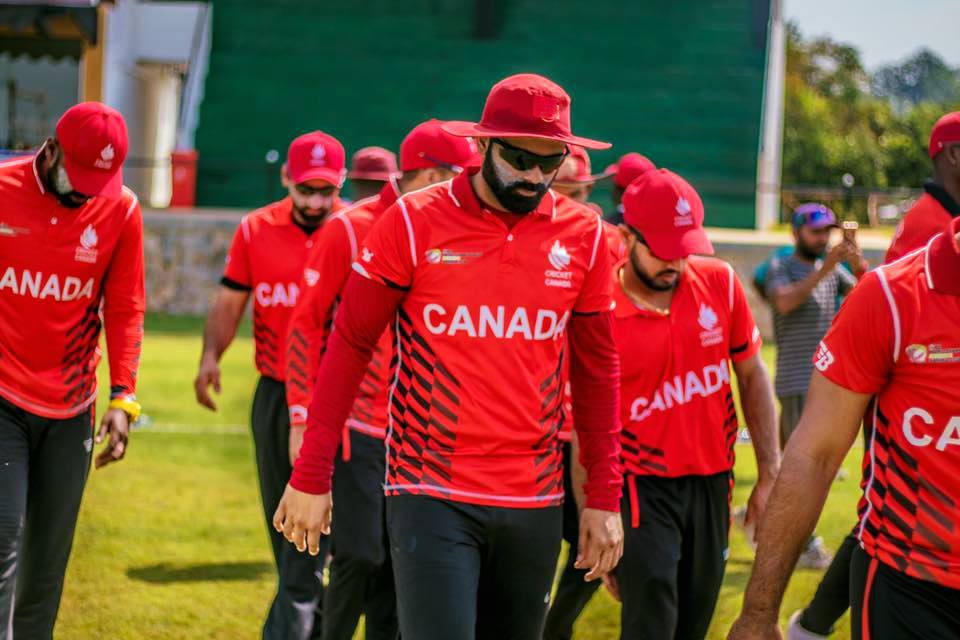By Tony McWatt– Publisher
Played 5, won 2 lost three. On paper that doesn’t sound too bad of a record for an international cricket team competing in an eight-nation Qualification tournament. Except that the two losses suffered by Team Canada, as holders of that record, effectively resulted in its failure to secure either of the available spots for participation at the forthcoming Australia-hosted 2022 ICC T20 World Cup.
An all too familiar occurrence that now suggests that a reboot of Canada’s team selection and preparation for its participation in future ICC T20 World Cup qualification tournaments might now be required. Having failed in its participation bid for this year’s forthcoming ICC T20 World Cup, Canada’s next opportunity to be part of that global event now won’t be available until the 2024 edition that is scheduled to be played in the Caribbean.
By the time 2024 rolls around at least five of the fourteen players who represented Canada in Oman would have passed the 35 years old mark. That’s the benchmark long considered to be the effective expiry
date age ceiling for T20I players.
The brighter flip side of that picture is, of course, that the Canadian Selectors will now still have a core of relatively young players who, having been a part of the failed Oman campaign would nevertheless
have benefited tremendously from the experience. Rayyan Pathan and the newly discovered, Australian-born Matthew Spoors both had fairly impressive showings in Oman.
Spoors scored a century on debut and ended the tournament as Canada’s highest run-scorer. Pathan’s
penchant for aggressive scores was only, largely, thwarted by his having been the victim of two run-out dismissals in his five innings batted. Add to those Hamza Tariq, who by 2024 will still only be 34, and
hopefully a returning Nitish Kumar and there would be a very solid top-order batting core to which some younger players can be added.
Anoop Chima and skipper Mihir Patel were Canada’s most outstanding players at the Caribbean-hosted ICC U19 World Cup, which preceded the Oman Qualifier. Sufficiently so as to warrant the Canadian Selectors
providing them with opportunities, at a higher competitive level, to stimulate their further development. The 2024 T20 World Cup qualification matches which will occur before that tournament is eventually staged would, therefore, present ideal opportunities for both Chima and Patel to establish their worthiness as Canadian T20
Senior team batsmen.
In terms of the bowling, Kaleem Sana (28 yrs), Harsh Thaker (24 yrs) and Salman Nazar (31 yrs) were Canada’s top wicket-takers in Oman. Sana captured 5 wickets for 104 runs at a 20.80 average and 5.47 economy rate from 19 overs bowled; Thaker’s returns were 4/38-7.0 overs, avg.9.50; econ 5.42 and Nazar’s 4/78 -11 overs, avg.19.5o; econ 7.09.
At the U19 World Cup Ethan Gibson, Parmveer Kharoud, Kairav Sharma and Sheel Patel were all among
the wickets. As such, they should in a manner identical to that suggested for the batters Anoop Chima and
Mihir Patel, be given as many opportunities as possible to prove their worthiness at higher competitive levels.
Regardless of who is eventually chosen to represent Canada in its 2024 World Cup qualification attempts,
what has become blatantly obvious from the Oman experience is that Canadian teams should be much
better prepared heading into such tournaments. It was no accident that the four eventual semi-finalists in
Oman had all participated in a quadrangular tournament a month before. Canada’s players by contrast hadn’t
played competitively since during the preceding November and their actual preparation for the Oman
tournament consisted of only three warm-up matches against eventual seventh-place finishers Germany.
“Those who ignore history are condemned to repeat it!” As a means of avoiding a 2024 repeat of the unsatisfactory 2021 win-loss record, a reboot to Canada’s T20 World Cup qualification approach is now
definitely required

